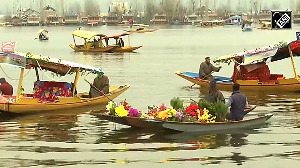By relentlessly campaigning to highlight the indifference of the Centre to safeguard the interests of Odisha in inter-state disputes, the BJD is seeking to pin down the BJP.
Dillip Satapathy reports.

Will the row in Odisha over two water-related disputes -- sharing of the Mahanadi river waters with Chhattisgarh and constructing the Polavaram dam in Andhra Pradesh -- prove to be weak links in the Bharatiya Janata Party’s effort to mount a formidable challenge to the ruling Biju Janata Dal in the 2019 state election?
This question, of course, will be answered by the outcome of the polls.
But, by relentlessly campaigning to highlight the indifference of the Centre to safeguard the interests of Odisha in these inter-state disputes, the BJD is seeking to pin down the BJP.
The party has held rallies, dharnas, and meetings across the state, highlighting the Centre's allegedly nonchalant attitude to safeguard Odisha's interests.
The Mahanadi is the largest river in Odisha, influencing its social, cultural, and economic life for ages.
Of its length of 857 km, after originating in the Sihawa mountain in Chhattisgarh, the river runs for 494 km in Odisha before meeting the sea.
Millions of people in 15 districts of Odisha depend on it for agriculture, fisheries, tourism, and other forms of livelihood.
Besides, the Hirakud dam, built on the river in the 1950s, has been an important installation for irrigation and power generation in the state.
Constructing six barrages upstream of the Mahanadi in Chhattisgarh has drawn the river into a bitter inter-state row.
Arguing the construction would choke the flow of the river, particularly in summer months, when the water level is significantly down, Odisha has drawn the attention of the Centre, urging it to ask Chhattisgarh to stop construction.
When the matter first cropped up two years ago, the then Union water resources minister Uma Bharti had called a meeting of chief ministers of the two states and suggested a resolution of the issue through talks within a joint framework.
Odisha, however, demanded stopping construction as a condition, a demand was rejected by Chhattisgarh.
Odisha has petitioned the Centre to form a tribunal to resolve the dispute and also moved the Supreme Court for redress of its grievances.
With the BJP being in power at the Centre and in Chhattisgarh, the Odisha unit of the party has been tentative in deflecting the criticism thrown at it.
The party, however, has 'exposed' the state government's laxity in dealing with Chhattisgarh during the initial phases of barrage construction, by referring to certain official communications and assembly discussions earlier.
However, the Centre's ambivalent stand on the issue has not helped the BJP's cause in the state.
Last year, responding to a query of an Odisha MP in Parliament, Minister of State for Water Resources Sanjeev Balyan had said with no sign of an amicable settlement, the Centre was considering setting up a tribunal to determine water sharing.
A couple of months later, through an affidavit in the apex court in November last year, the Centre said there was no need for a tribunal because the matter could be settled through discussion.
Recently, Union Water Resources Minister Nitin Gadkari wrote to Odisha Chief Minister Naveen Patnaik, again calling for a resolution of the issue through talks.
In response, Patnaik reiterated his demand for a tribunal and ruled out talks with Chhattisgarh.
A state BJP leader said tribunals on river water sharing took a long time to give their awards. The issue can be sorted early if the two sides sit and talk.
He further said the Centre would soon to enact a law for a unitary tribunal to resolve all river water-sharing issues.
Similarly, Odisha is peeved with the Centre for giving national project status and funding to the Polavaram dam, being built in Andhra Pradesh, bordering Odisha.
The state fears inundation of large tracts of southern Odisha, inhabited by tribals.
Both the Mahanadi and Polavaram have come in handy for the ruling BJD to go for campaigns to woo farmers and tribals, two of its key constituencies.
"This strategy won't work," said BJP state unit vice president Samir Mohanty.
"They (BJD) tried to play up these issues during the panchayat polls. But they failed as their arguments are built on falsehood. We did well in the western districts, where the Mahanadi is considered a lifeline, and also Malkangiri, where tribals are supposed to get affected by the Polavaram project," Mohanty said.
IMAGE: BJP president Amit Shah welcomed by party workers in Bhubaneswar. Photograph: Courtesy bjp.org












 © 2025
© 2025